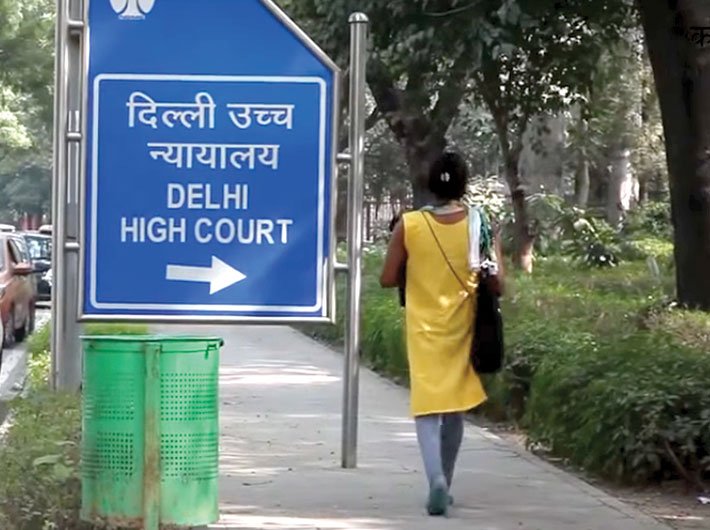It has been three months and Babli has adjusted to her new routine quite well. She wakes up early in the morning to quickly finish her household chores. She cleans, cooks, packs her lunch and irons her clothes before getting ready for work. She is very particular while applying makeup on her face – first, evenly dabbing some compact powder all over, then thickly lining the eyes with black kajal and finally, placing a small red bindi between her eyebrows. As she gets ready, some peppy Bollywood numbers play on her television. She doesn’t linger in the house for long after that and walks out the door in time. Babli, after all, has to take a long journey from Harola in Noida to her new workplace in central Delhi – the Delhi high court.
Her eyes light up when she flashes her identity card to the guard at the entry point. Babli’s card not only identifies her as a court attendant but also provides her a dignified individuality, which has been denied to her and others like her, for long.
Twenty-eight-year-old Babli is the only transgender employed with the Delhi HC on a two-year contract. With her appointment, the Delhi HC has become the second judicial body in the country, after Karnataka HC, to recruit transgender staff.
In 2017, Babli, along with five acid attack victims, was offered a job in the court. All of them have been deputed at different places like library and reception, depending upon their educational qualifications. Babli issues entry passes to visitors at the court gate. The decision to hire them in an institution like the Delhi HC is seen as an important precedent in affirmative action, and Babli is very happy to be a part of it.
This is not Babli’s first job by any means, yet she has never felt so stable and secure. She credits getting a ‘sarkari’ job to the efforts led by the Delhi State Legal Services Authority (DSLSA) and Delhi HC acting chief justice Gita Mittal.
Recalling her meeting with Mittal, Babli says with a smile on her face, “I had conveyed it to her that people are not willing to recruit transgenders in formal workplaces. I said that I wanted a job that can make my future and life secure. I want to retain my freedom. She listened to all I had to say and I was offered the job later. That meeting changed my life.”
The DSLSA provides free legal service to the weaker sections of society. Its clients include acid attack victims and transgenders among others. It also gives training to transgenders and hires them as paralegal volunteers.
“Under the law, it is mandated to make an effort to rehabilitate them [transgenders and acid attack victims], and employment can be the best way to do that,” says Sanjeev Jain, member secretary, DSLSA. Therefore, a note was put up before the chief justice of the Delhi HC, who is also the executive chairperson of the DSLSA, to help some of the really hard-pressed victims and transgenders. “Justice Gita Mittal directed the high court to call some of the victims for interaction. About 10 victims and a transgender had come. But the jobs were limited. The chief justice then directed the court administration to explore some possibilities and see if it can help them. After that, the procedure was started by the court and six persons were recruited. It was only due to her [justice Mittal’s] intervention that this was possible,” says Jain.
No formal sensitisation drive was conducted in the court premises for the other employees before inducting Babli and five acid attack victims. But the registrar general of the court maintains that efforts have been made to facilitate their smooth assimilation. “Our registrar (vigilance) has been visiting and talking to them. She has ensured that they will be given their space and place. The basic purpose is not to give them just employment, but also recognition, dignity and status in the society,” he says.
But certain issues still persist. For instance, there is no gender-neutral washroom for Babli in the court. As per the supreme court’s 2014 judgment that recognised transgender as the third gender, separate washrooms have to be created for transgenders. Babli says she still uses the toilet which is designated for ‘cisgenders’. [The term, opposite of ‘transgender’, refers to a person whose gender identity matches with the biological sex they were born with.]
This apart, Babli feels comfortable working in the court premises. “People are very friendly. They don’t make me feel like an outsider. There are a couple of persons, who maintain their distance, and don’t like talking to me. But I am hopeful that it will gradually change,” Babli says.
Babli feels that instead of just crying the blues, the transgender community needs to understand the root of the problem, which is ignorance. “I have watched a lot of interviews of hijras on television, where all they do is shed tears and blame society for their misery. There are terrible people out there indeed, but society as a whole is not bad, and should not be blamed. Most of the people are just unaware. If you would have been as unaware as them, you would have done the same thing. When they will find out more about us, they will gradually understand us,” she says.
Babli even has a pragmatic approach when it comes to coexisting with the brassbound, patriarchal mindset of the masses. “Pani me reh ke magarmach se dushmani mat karo. [Don’t make a crocodile your enemy, if you want to survive in the water.] Similarly, you can never be a part of that society, if you continue to inculpate it,” she advises.
Babli’s overall positive outlook has kept her from giving up on life, says Sarita Shukla from the NGO Pahal Welfare Society. A few years ago, Babli had joined Pahal as a volunteer to work for the betterment of hijras and LGBT community. She soon started working as the area manager for Pahal. “But regular payment was an issue,” says Shukla, adding, “Even we are dependent on funding, and when there was a deficit, we could not pay her salary on time. Unlike the rest of us, she doesn’t live with her family and has to pay rent. So not earning was not an option for her.”
Babli’s family never came to terms with her sexual identity. “Jise pariwar mil gaya, usse sab kuch mil gaya [If you have your family’s support, you have everything],” she says in a sombre tone. She hasn’t visited home in the past 11 years. Only her mother calls sometimes to ask about her whereabouts and insists that Babli should go back to being a man, and return home. “But how can I pretend to be someone that I am not?” questions Babli.
Recalling her childhood, which was full of taunts and sneers for not being “manly enough”, Babli says, “I was brought up like a boy, but I have always been effeminate. I used to dance like girls, talk like girls, wore clothes meant for girls. As I grew up, I found myself sexually attracted to men. I shared my feelings with a friend when I was 10, who, one can understand why, told me that I was abnormal. Nobody from my family or school could understand what I was going through. I was either shamed or bullied for being effeminate.”
“I kept feeling like a misfit,” she continues with a stoic expression on her face. It was another transgender in her locality who helped her understand terms like gay, transgender and bisexual. “I told her how I felt, and she made me realise that I am a transgender. I was so relieved. Mujhe meri pehchaan mil gayi [I found my identity],” she says.
In India, while transgenders are ostracised on one hand, their blessings or curses are considered powerful on the other hand. Taking charge of her life, Babli left her house and started living with a troupe of hijras. “In India, a transgender has typically three options for earning livelihood. One is performing on auspicious ceremonies like weddings or christenings, also known as toli; second is asking for alms on the streets; or to look for sex work,” she explains.
Initially, Babli liked living with the community of hijras and felt like she belonged with them. But soon their strict rules and strenuous routine started suffocating her. “The senior-most leader of a hijra troop is addressed as ‘guru’. When you join a troop, initially they’re very affectionate towards you. But once they know that you have nowhere else to go, they start imposing their strange rules,” she says.
Talking about these rules, Babli says that gurus allow transgenders to have one partner. Those who don’t, are looked at through a prism of suspicion. “They’re scared that we will have multiple affairs and damage their reputation, so our actions are closely monitored. There are several other odd rules too. We’re supposed to pay monetary fines for our mistakes. There are payoffs if a transgender wants to switch to a different troupe. Gurus have the power to banish us from the whole community, if they think that we have done something unforgivable. I felt that this is not the kind of freedom I had subscribed for. I left the community within a year,” she says.
Babli then tried her hand at a number of other jobs. She worked in a factory, with some NGOs and even at traffic signals. “I can dance well, so a fellow transgender asked to me start dancing for orchestras. That helped me earn quite some money,” she says.
One of the few options that help transgenders make good money is sex work, says Shukla of NGO Pahal. “When she [Babli] didn’t get her salary on time, she had to opt for sex work. We knew that there was not much else she could do to survive. We didn’t have the finances to help her either,” says Shukla.
Babli’s contractual job as a court attendant might not seem as a big feat, but it holds a lot of promise for her. “There are always ways to make money. I have earned much more from being part of a toli or an orchestra. This job has given me the dignity that I have been searching for,” she says.
As of now Babli’s job is contractual, but she hopes to find a permanent and stable job within the judicial institution itself. Babli also wants to pursue her other dreams: “I want to buy my own house. I also want to learn a classical dance form.” She is also considering a sex-change operation, if and when she can afford it. “Although that does not mean that I will no longer be a transgender. It’s a misconceived notion that a transgender can turn into a woman. We never can,” she says.
pranita@governancenow.com
(The article appears in the March 15, 2018 issue)

